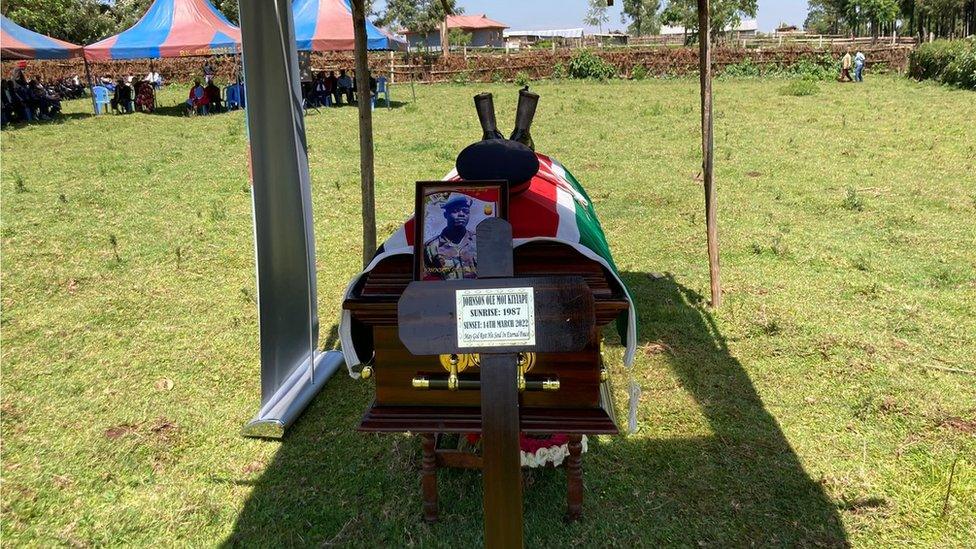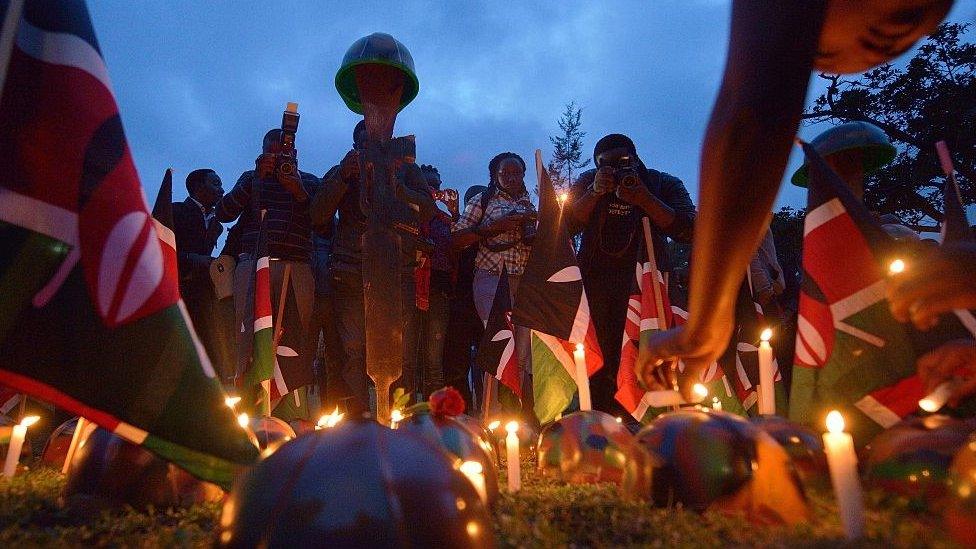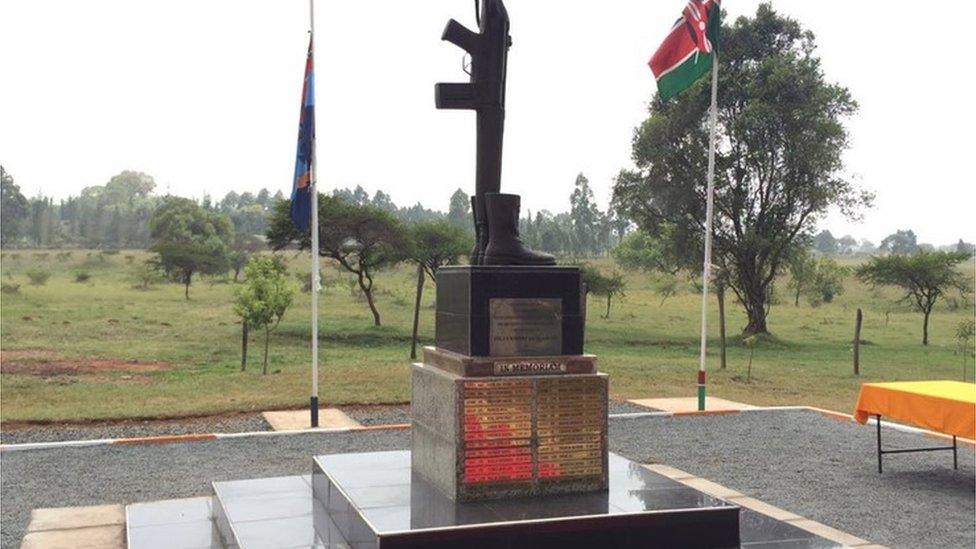Kenyan soldiers killed in Somalia: The shroud of secrecy
- Published

Johnson ole Kiyaipi's wife broke down in tears during a commemoration for her husband
Johnson ole Kiyaipi was buried with full military honours in his Kenyan home after he was killed by a roadside bomb in Somalia, even though neither the army nor the government has publicly acknowledged his death.
The killing of the 35-year-old and nine of his colleagues last week, reportedly at the hands of al-Shabab, has fuelled calls for Kenya to withdraw its troops from Somalia, where they have been fighting the militant group since 2011.
The official silence has only worsened the frustration of Mr Kiyaipi's family in Kilgoris, south-western Kenya.
"How many other young men are we going to lose before our boys are brought back home? How many more families should bear the pain of this war fought in distant lands?" asked his elder brother Dr Joel ole Kiyiapi.
"If our boys should die, they should die protecting our country within our borders."
At the funeral service, the casket of Mr Kiyaipi was carried shoulder high by soldiers to a small tent at the front of the ceremony attended by hundreds of villagers.
The coffin was draped with the Kenyan flag and on top of it were placed his military cap, belt and boots.

In recent days al-Shabab has carried out increased attacks in Somali and in Kenyan territory
Mr Kiyaipi's wife broke down in tears when the tribute she had written for her husband was read out by a friend: "Your children and I will miss you and your lovely smile. Shine on your way my love," the speech read.
"You've been the best part of my life and the love of my life. You've never left me down since we said: 'I do,'" it continued.
As Mr Kiyaipi's body was lowered into the grave, his army colleague gave him a 21-gun salute as some mourners overwhelmed by grief fell down and wailed.
Speaker after speaker said many families had lost loved ones since Operation Linda Nchi (Operation Protect the Country) began 11 years ago.
The military intervention was triggered by the militant group's kidnapping of two tourists in Lamu county near the Kenyan-Somalia border.
Two years later, the troops were incorporated into the African Union Mission in Somalia (Amisom), a force formed to help Somalia stabilise and fight al-Shabab militants.
'Why hide the dead?'
"If the US withdrew from Somalia, who are we Kenyans to continue staying there?" a village elder asked.
"We are in pain for all the young men who have died while in Somalia. It's time for them to come back home and guard our borders," Joseph Tasur continued.

This 2015 vigil commemorated Kenyan soldiers killed at an African Union base in south-west Somalia
Family members of soldiers are angry about the government silence when Kenyan troops die in action. They say the blackout and lack of public honouring is disrespectful. The authorities have not explained why they keep quiet about military deaths.
Current estimates suggest hundreds of Kenyan soldiers have died in Somalia, with the 2016 El Adde attack by Islamist militants resulting in around 200 deaths.
The military said it would launch an inquiry and release details of the soldiers who had died in the attack six years ago, but so far this has not been done.
"We know you are protecting our country, you are protecting us. Why do we hide our soldiers when they die in action?" asked Prof James ole Kiyaipi, another of Johnson's brothers and a former politician.
'The government must be open'
Prof Kiyaipi said he was surprised there was no debate amongst lawmakers or the public about the goal of Kenyan forces in Somalia.
"We need to rethink our strategy and have a clear end-date for our troops there. It cannot be an indefinite mission and we sure can't afford to keep losing our young men in this war," he told the BBC.
"Every fallen soldier is a father, a son, a daughter. The president needs to publicly acknowledge our heroes," he continued.
"We are the taxpayers and the government has a responsibility of being open," he said.

There are military monuments which bear the names of fallen soldiers, however they are not open to the public
There was further fury online in Kenya just last week when the US military honoured three Kenyan soldiers for their bravery during the Manda base attack in January 2020, while the Kenyan government and armed forces did not offer any commendations.
The only official acknowledgement of the Kenyans who have been killed in action is the monuments which have been inaugurated by President Uhuru Kenyatta on the annual Kenya Defence Forces day - a tradition was started after the military went into Somalia.
The monuments inside military barracks feature a gun, two boots and a helmet on top of the rifle.
They also bear the names of those killed fighting al-Shabab, so the name of Johnson ole Kiyaipi is expected to be added.
However, these military barracks and monuments inside them remain closed to the public.